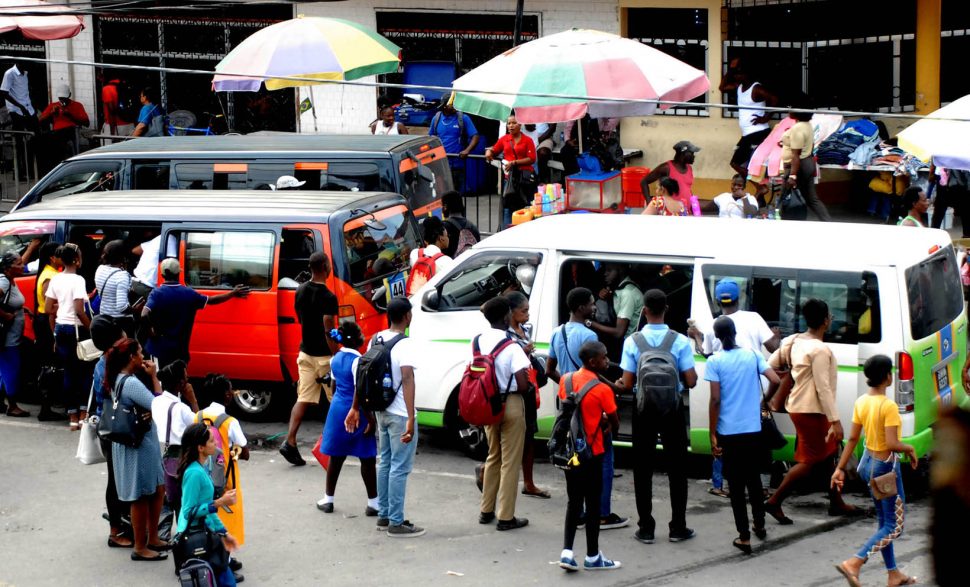As the quality of the urban public transport service comes increasingly under the glare of the public spotlight the Stabroek Business, two weeks ago, spent two consecutive weekdays canvassing the opinions of regular users on the quality of the service being provided.
The responses which we secured to the issues that we raised represent a summation of the across-the-board opinions of the commuters with whom we spoke. These reflect both their general observations and their criticisms:
On private ownership of public transport:
On the whole our respondents were supportive of a privately-owned public transport system which they pointed was good for private enterprise and for job-creation. Respondents particularly made the point that privately-owned minibuses could provide both an employment option for persons who are not qualified for mainstream employment as well as for employed persons seeking to subsidize their incomes. However, they were virtually unanimous in the view that privately-owned vehicles that are part of the public transport pool should be subject to strict rules and regulations laid down by the state public transport authority. These rules, they say, should embrace areas such as (1) performance and cleanliness standards for buses; (2) Behavioural ‘qualifications’ for minibus crews; (3) Strict and enforceable protocols associated with safe and responsible road use; (4) A rigid system of half-yearly renewal of operating licences for drivers and conductors based on the quality of service over the previous year; (5) Temporary and permanent removal of operating permits based on the quality of service provided during the immediately preceding period.
On the quality of service currently being provided by the privately-run coastal transport system:
Responses varied from one route to another with the routes covering Georgetown and its immediate environs receiving the less salutary assessments. Rough, uncouth and sometimes violent minibus crew members, the abuse of passengers, the overcrowding of buses, excessively loud music and confrontations with passengers were represented as being among the common occurrences. The point was also strongly made that these tendencies were reinforced by strong passenger intimidation which restricted passengers’ inclination to protest these various abuses. Passengers using most of the coastal routes outside of Georgetown said that by and large their experiences are different since in many cases the bus operators were known to them, often as residents of the same community or nearby communities and that that sense of community-mindedness prevailed in their relationships as operators and communities.
On some of the major problems facing the privately run public transport system.
Almost universally, commuters feel that the absence of alternatives and the resulting ‘abuse’ and exploitation of commuters is the principal problem facing the sector. They point out that in many cases mini bus crews appear to have no interest in the welfare of their passengers beyond their fares.
On the biggest obstacles to the enhancement of the quality of the service:
Virtually unanimously, the commuters with whom the Stabroek Business spoke believe that the existence of improper relationships between police traffic ranks and minibus crews is a major factor inhibiting the correction of the existing public transport challenges. Large numbers of commuters believe that transgressors among minibus crews are considerably ‘comforted’ by their “improper relationships” with traffic cops, so that they do not bother unduly about penalties for their various infractions. Worryingly, blame for the persistence of poor service standards in the public transport sector is blamed on ‘people in authority’ in the Force who are felt, variously, to be indifferent to the misconduct of policemen assigned traffic management duties or else, themselves benefitting from what are widely believed to be entrenched corrupt relationships.
Solutions:
The solutions are generally felt to inhere in the creation of a strong and rigidly enforced rules-based regime for the public transport sector. Here the Police Force comes in for considerable criticism for what many feel is the practice of knowingly turning a blind eye to the negative practices (worse, functionaries with influence are widely believed to be actively encouraging such practices) that manifest themselves in the sector. On the whole, the view of the commuters with whom this newspaper spoke is that it requires the strong and uncompromising enforcement of rules for the functioning of the public transport system to bring about significant improvement in the quality of the service.
This exercise involved brief interviews with fifty-two commuters who regularly use minibuses plying routes in regions Three, Four and five.









